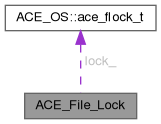A wrapper around the UNIX file locking mechanism. More...
#include <File_Lock.h>

Public Attributes | |
| ACE_ALLOC_HOOK_DECLARE | |
| Declare the dynamic allocation hooks. | |
Protected Attributes | |
| ACE_OS::ace_flock_t | lock_ |
| Locking structure for OS record locks. | |
| bool | removed_ |
| bool const | unlink_in_destructor_ |
Private Member Functions | |
| void | operator= (const ACE_File_Lock &)=delete |
| ACE_File_Lock (const ACE_File_Lock &)=delete | |
Detailed Description
A wrapper around the UNIX file locking mechanism.
Allows us to "adapt" the UNIX file locking mechanisms to work with all of our Guard stuff...
Constructor & Destructor Documentation
◆ ACE_File_Lock() [1/3]
| ACE_File_Lock::ACE_File_Lock | ( | ACE_HANDLE | handle = ACE_INVALID_HANDLE, |
| bool | unlink_in_destructor = true ) |
Set the <handle_> of the File_Lock to handle. Note that this constructor assumes ownership of the handle and will close it down in <remove>. If you want the handle to stay open when <remove> is called make sure to call <dup> on the handle. If you don't want the file unlinked in the destructor pass a zero value for <unlink_in_destructor>.
◆ ACE_File_Lock() [2/3]
| ACE_File_Lock::ACE_File_Lock | ( | const ACE_TCHAR * | filename, |
| int | flags, | ||
| mode_t | mode = 0, | ||
| bool | unlink_in_destructor = true ) |
Open the filename with flags and mode and set the result to <handle_>. If you don't want the file unlinked in the destructor pass a false value for unlink_in_destructor.
◆ ~ACE_File_Lock()
| ACE_File_Lock::~ACE_File_Lock | ( | ) |
Remove a File lock by releasing it and closing down the <handle_>.
◆ ACE_File_Lock() [3/3]
|
privatedelete |
Member Function Documentation
◆ acquire()
Note, for interface uniformity with other synchronization wrappers we include the acquire() method. This is implemented as a write-lock to be on the safe-side...
◆ acquire_read()
Acquire a read lock, but block if a writer hold the lock. Returns -1 on failure. If we "failed" because someone else already had the lock, errno is set to EBUSY.
◆ acquire_write()
|
inline |
Acquire a write lock, but block if any readers or a writer hold the lock.
◆ dump()
| void ACE_File_Lock::dump | ( | ) | const |
Dump state of the object.
◆ get_handle()
|
inline |
Get underlying ACE_HANDLE for the file.
◆ open()
Open the filename with flags and mode and set the result to <handle_>.
◆ operator=()
|
privatedelete |
◆ release()
Unlock a readers/writer lock.
◆ remove()
Remove a File lock by releasing it and closing down the <handle_>. If unlink_file is true then we unlink the file.
◆ set_handle()
|
inline |
Set underlying ACE_HANDLE. Note that this method assumes ownership of the handle and will close it down in <remove>. If you want the handle to stay open when <remove> is called make sure to call <dup> on the handle before closing it. You are responsible for the closing the existing handle before overwriting it.
◆ tryacquire()
Note, for interface uniformity with other synchronization wrappers we include the <tryacquire> method. This is implemented as a write-lock to be on the safe-side... Returns -1 on failure. If we "failed" because someone else already had the lock, errno is set to EBUSY.
◆ tryacquire_read()
|
inline |
Conditionally acquire a read lock (i.e., won't block). Returns -1 on failure. If we "failed" because someone else already had the lock, errno is set to EBUSY.
◆ tryacquire_write()
|
inline |
Conditionally acquire a write lock (i.e., won't block). Returns -1 on failure. If we "failed" because someone else already had the lock, errno is set to EBUSY.
◆ tryacquire_write_upgrade()
|
inline |
Conditionally upgrade to a write lock (i.e., won't block). Returns -1 on failure. If we "failed" because someone else already had the lock, errno is set to EBUSY.
Member Data Documentation
◆ ACE_ALLOC_HOOK_DECLARE
| ACE_File_Lock::ACE_ALLOC_HOOK_DECLARE |
Declare the dynamic allocation hooks.
◆ lock_
|
protected |
Locking structure for OS record locks.
◆ removed_
|
protected |
Keeps track of whether <remove> has been called yet to avoid multiple <remove> calls, e.g., explicitly and implicitly in the destructor. This flag isn't protected by a lock, so make sure that you don't have multiple threads simultaneously calling <remove> on the same object, which is a bad idea anyway...
◆ unlink_in_destructor_
|
protected |
Keeps track of whether to unlink the underlying file in the destructor.
The documentation for this class was generated from the following files: